Description
ABSTRACT
Directors’ Personal Liability in Nigerian Corporate Law
Dr. Wale Olawoyin, SAN*
Directorial appointments in public companies (quoted and unquoted), international and multinational companies, and highly successful domestic private companies are fashionable and well sought after in Nigeria. This is presumably to enjoy the perceived financial benefits and prestige attached to the office of director. In reality, a directorial appointment is a double edged sword. Benefits come with burden and the burden has the potential of outweighing the benefit if lip service is only paid to the ideals of corporate governance in light of the rise of unbridled exercise of corporate power by executive directors. Recent developments in Nigeria appear to confirm this assertion where non-executive directors are being held personally responsible for the malfeasance of executive directors. The liability of directors formal feasance or malfeasance in the corporate law arena has been and remains the subject of several statutory provisions and judicial pronouncements at Common Law. In Nigeria, the legal contours of such liability in legislations are to a large extent settled. However, the imposition of personal liability on directors in cases where the veil of incorporation is lifted has taken new dimensions in Nigeria. This is especially important at a time when commission of crimes by corporate proxy is now commonplace in Nigeria. This article reviews the various statutory provisions on the liability of directors and highlights the apparent willingness of Nigerian courts to lift the veil of incorporation to impose personal liability on non-executive directors in fraud cases in civil or criminal contexts against the company. In the final analysis, non-executive directors of Nigerian companies must beware.
INTRODUCTION
The corporate personality principle as enunciated in the celebrated case of Salomon v Salomon1 is one of the foundational pillars of corporate law.2 The segregation of the artificial entity from its corporators has the potential of negatively impacting on third parties who interact with the company. The respective decisions in the High Court through to the House of Lords in that case are testament to the divergent reactions to the corporate vehicle as a potential instrument of fraud by the alter egos of the company. A necessary and inevitable import of the corporate personality principle, was the evolution of another equally important doctrine of piercing the veil of incorporation, intended to temper or attenuate the high risk of encouraging fraud through corporate proxy.3 Typically, where the corporate vehicle is being used as an instrument of fraud, the doctrine of lifting the veil would be invoked and deployed as the driving force behind the assault on the citadel of corporate personality. In order that the corporate personality principle is not applied more in breach than in observance, it was essential that the instances in which the corporate veil is broken are premised on a coherent thread of principles that ensures a sparing invocation of the principle in appropriate cases. Striking that balance has been a challenge for the courts even in England where the principle evolved. In Nigeria, there appears to be a sentimental approach where the courts are increasingly more inclined
* LL.B (Hons.) (Ife), LL.M (London), Ph.D. (Bristol). Senior Lecturer, University of Lagos
- (1897) AC 22
- This principle is fully recognised in Nigeria. See Marina Nominees v FBIR (1986) LPELR-SC 112/1984; (1986) 2 NWLR (Pt 20) 48; Nigerian Deposit Insurance Corporaion v Vibelko Nig. Ltd (2006) All FWLR (Pt 336) 386, 389; New Nigerian Newspaper Ltd v Agbomabami (2013) LPELR-CA/K/137/2011; New Resources Int’L Ltd & Anor v Oranusi (2010) LPELR-CA/L/461/08; NBCI v Integrated Gas Nig. Ltd (1999) 8 NWLR (Pt 613) 119, 129; For a comprehensive review of Nigerian corporate law on this point, see J.E.O. Abugu, Principles of Corporate Law in Nigeria (2014) at 181 (hereafter referred to as Abugu, Principles of Corporate Law)
- See FDB Financial Services Ltd v Adesola (2002) 8 NWLR (Pt 668) 170; Aderemi v Lan & Baker (Nig.) Ltd (2000) 7 NWLR (Pt 663) 33; Tafida & Anor v Garba (2013) LPELR-CA/YL/24/2012; Nika Fishing Co. Ltd v Lavina Corporation (2008) 16 NWLR (Pt 1114) 509, 543; African Re-Insurance Corporation v Fantaye (1986) 1 NWLR (Pt 14) 133

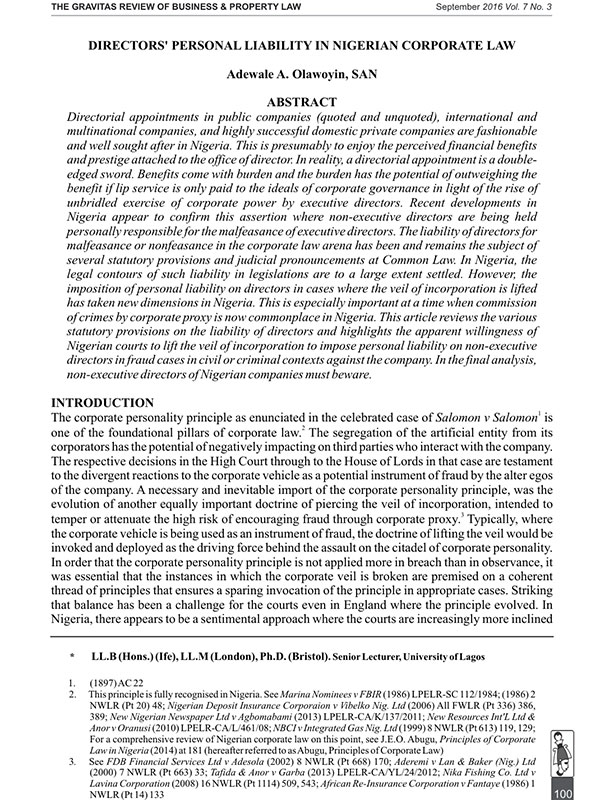
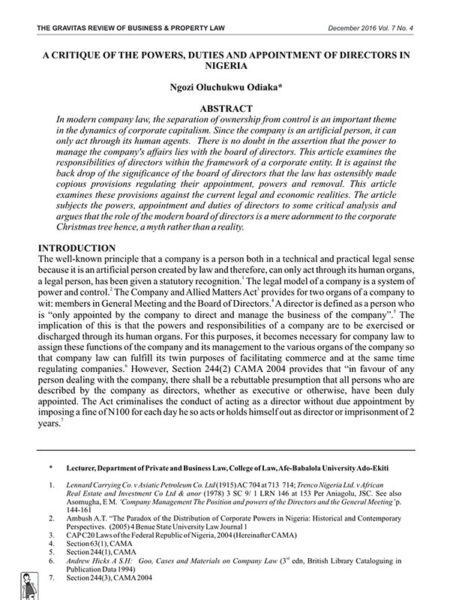
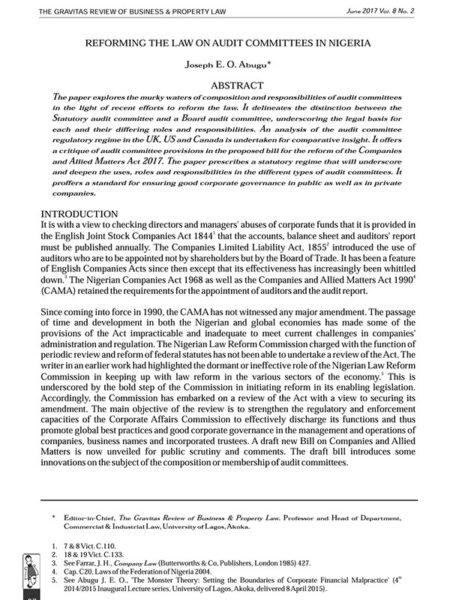
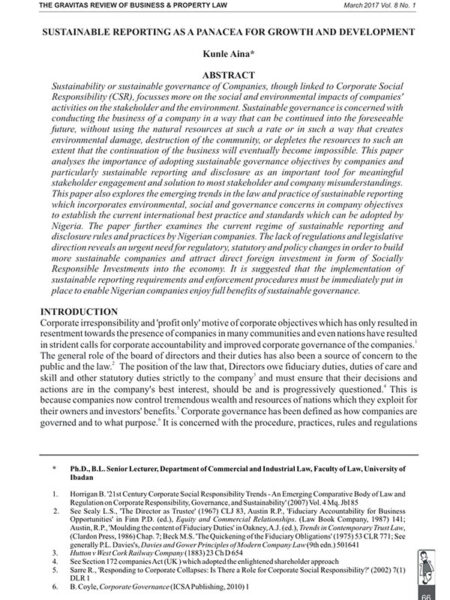
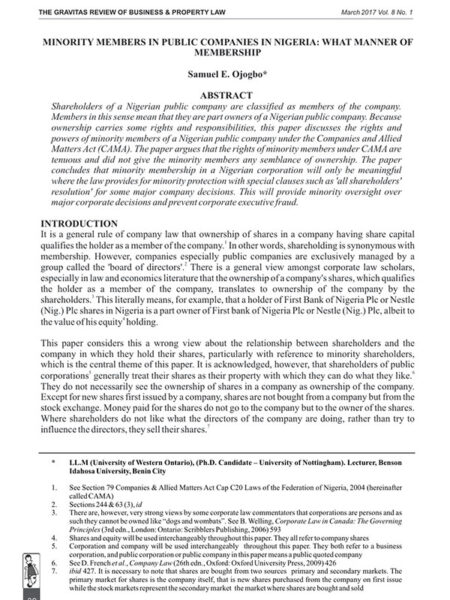


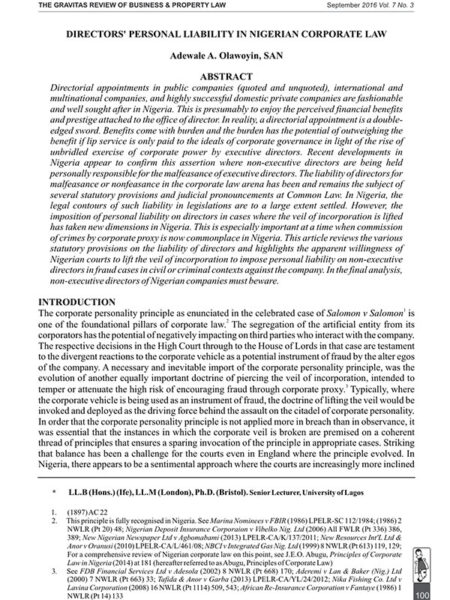
Reviews
There are no reviews yet.